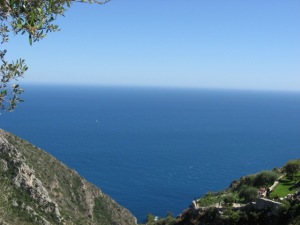I DON’T KNOW
 Whether your brand of faith is organized or something more organic, practicing an attitude of trust in whatever is happening in your life right now without the certainty about what it means or how it will turn out, takes a willingness to be okay with these three little words: “I don’t know.”
Whether your brand of faith is organized or something more organic, practicing an attitude of trust in whatever is happening in your life right now without the certainty about what it means or how it will turn out, takes a willingness to be okay with these three little words: “I don’t know.”
We know that it is true that we don’t REALLY know how things will turn out, but it is still hard to not run from this reality. Security is in many ways hard wired into all of us. But saying and meaning “I don’t know” provides you with a little space to pause for a bit. In response to any sense of inner or outer urgency you may be experiencing, you can wait and get a little comfortable with the unknown. Without reaching for the metaphorical security blanket, a blanket that comes in a million forms, you begin to see things as they are.
Sometimes during times of personal crisis/personal growth we come face to face with a fiercely held truth of ours (which is in some ways a very profound type of security blanket). One that needs to be reexamined and perhaps even released in order to continue the journey. This is not easy.
In all of this, we are being asked to surrender our ego. And it will not recede quietly. The ego, bossy and brazen, demanding and full of expectations, is our fortress of defense mechanisms against the many-headed monster, aka the sum of our fears. And it’s a tenacious part of who we are.
Yet it’s helpful to understand that the ego is best understood as a “child king”, one who wields great power but has little in the way of wisdom or maturity. Lacking these vital tools, it does little to serve us in making the best decisions for ourselves, in terms of love and happiness, in the ways of growing into our best self.
 That’s because, like any child, it only knows what it has been taught by influential others in its life. Most of our ego was developed during our formative years, and much of that was influenced by outside forces-our parents, family, and the environment in which we were raised. Unfortunately, this was also when we were least able to decide between helpful and harmful information, between truth and mere opinion.
That’s because, like any child, it only knows what it has been taught by influential others in its life. Most of our ego was developed during our formative years, and much of that was influenced by outside forces-our parents, family, and the environment in which we were raised. Unfortunately, this was also when we were least able to decide between helpful and harmful information, between truth and mere opinion.
When we release the ego, we remove the block to love, clarity and wisdom.
As for me, I have believed many things and some of them quite passionately. Most have proved themselves to be wrong. And those that may be right, does it make a difference to the quality of my relationships, to the healing of the planet’s ills? I dare say, no. In fact, my precious opinions have never made anyone happy, least of all me.
There is a bliss in knowing that I am not my opinions. There is a bliss in not knowing.
 Growing in the spiritual life is the opposite of an egoist venture. It takes place not by acquisition of something new. Growth is accomplished not by knowing things or even by gathering more information, but by releasing our current defense postures. It is only in the letting go of fear and our attachment to self-image, that the soil of our non-knowing can be a fertile one. “I know” doesn’t get us anywhere but separate and lonely. Non-knowing, giving up expectations, reaps a harvest of love and a simple peace.
Growing in the spiritual life is the opposite of an egoist venture. It takes place not by acquisition of something new. Growth is accomplished not by knowing things or even by gathering more information, but by releasing our current defense postures. It is only in the letting go of fear and our attachment to self-image, that the soil of our non-knowing can be a fertile one. “I know” doesn’t get us anywhere but separate and lonely. Non-knowing, giving up expectations, reaps a harvest of love and a simple peace.
We still get to choose what we believe, we can still have discussion about our thoughts. But we no longer feel compelled to defend our opinions so ardently. We realize that we are not, in fact, our opinions.
Quote for the day: “Look at how many rigid stands I’ve taken in the past that now I see were mistaken. So how is this new stand different? When I take a stand against another child of God, I split my mind. That doesn’t mean, never write a letter to the newspaper, or keep taking the car to an incompetent mechanic. But it does mean, take no stand against that mechanic in my heart.” – Hugh Prather
